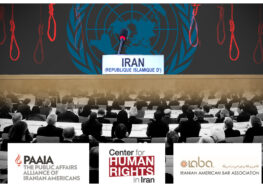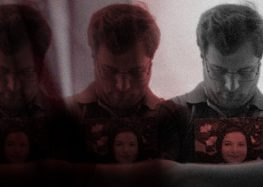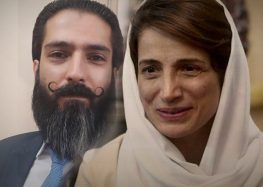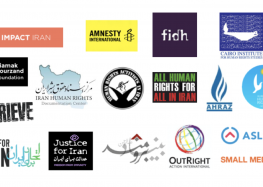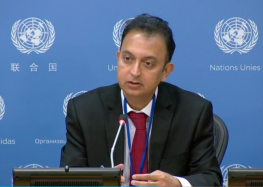So-Called NGOs that Support Torture and Child Executions
 Campaign’s daily blog from Geneva, Switzerland — Of all the countries whose human rights conditions are currently on the agenda of the Human Rights Council (HRC) or about whom there is criticism in various sections of the four-week long HRC session, Iran and China are two of the few who have mobilized their pro-government NGOs during the session and are actively trying to deflect attention from themselves by attacking their critics.
Campaign’s daily blog from Geneva, Switzerland — Of all the countries whose human rights conditions are currently on the agenda of the Human Rights Council (HRC) or about whom there is criticism in various sections of the four-week long HRC session, Iran and China are two of the few who have mobilized their pro-government NGOs during the session and are actively trying to deflect attention from themselves by attacking their critics.
Many attendees have been surprised to observe the silence from pro-government Iranian NGOs about the situations of Iranian prisoners of conscience, ethnic and religious minorities, and university students at the hands of judicial and intelligence organizations, even after dozens of people were killed and thousands arrested during peaceful protests following the June 2009 presidential election.
“The Iranian pro-government organizations ignore the cases of human rights violations and never say anything that Iranian authorities may not like. The presence of such organizations at the session is quite regrettable, as they are responsible for continuing the present conditions in Iran, under the guise of human rights. They are the ones who cover up for the grave situation of human rights in Iran, and try to deceive the international community, enabling the Iranian government to continue this situation,” a participating NGO member at the session told the International Campaign for Human Rights in Iran.
Mohtaram Jamali, an individual accompanying the Iranian delegation who is a member of the Communication Network of Iranian Women’s NGOs, had an exchange with Sohrab Mokhtari, the son of dmurdered author Mohammad Mokhtari. A video of the exchange was posted online last week. In the video, Jamali challenges Mokhtari’s statements about the murder of his father by the Iranian Ministry of Intelligence in 1998 during what came to be known as the “serial murders of Iranian intellectuals.” Jamali’s challenge was particularly shocking as the 1998 serial murders of intellectuals have been formally and publicly acknowledged by the authorities in the Islamic Republic. When victims of human rights violations, such as “starred students” who are banned from continuing their education, approached Jamali with their grievances, she said that she had never heard of this issue. Jamali continued saying that if this is true, she would need the evidence so that she could follow up on it. She provided similar replies when asked about Iran’s political prisoners. “The Iranian Judiciary would not imprison anyone without a reason. Our country has laws,” she said.
Some of the NGOs accompanying the Iranian delegation are represented by individuals who have very close ties with regime authorities. The Organization for Defending Victims of Violence (ODVV) is an NGO that in spite of its name, has not done anything during the session to defend the rights of Iranian victims of violence. The organization underwent changes last year when its long-time director, Alireza Taheri, was replaced by Siavash Rahpeyk, a supporter and close associate of Mahmoud Ahmadinejad. It was reported that Taheri left the organization due to health problems. Sources close to the organization though told the Campaign that his criticism about Iran’s Universal Periodic Review and differences of opinion about management of the organization were the causes for the change.
Some of the individuals reading ODVV’s statements, during the time allotted to civil society organizations, spent their time criticizing the US government in the areas of sanctions on the sales of aircraft parts, events at Guantanamo Bay Prison, and subjects such as police brutality and discrimination against minorities African Americans in the US.
The most astonishing characteristic of some of the mentioned individuals and organizations are the individuals who not only do not accept the instances of rights violation in Iran but defend them. A member of Iran’s NGO group, for example, explicitly defended torture in the areas where national security or other citizens’ security is concerned, and openly supported the execution of juvenile offenders. Another individual in the NGO delegation supported the large number of execution of drug traffickers and regarded it as a point of pride for the Islamic Republic of Iran in the area of fighting drugs. Several individuals accompanying the government and the NGO delegation supported the government’s policy of arresting, sentencing to long prison terms, and even the execution of dissidents, calling those individuals “seditionists” and “combatants against God,” (mohareb) who must be punished.
While Iranian authorities claim the mentioned individuals represent Iran’s civil society, those attending the session have no doubt that in the show the Islamic Republic has prepared to cover up the situation of human rights in Iran, such organizations not only do not represent Iran’s civil society, but are tools for the continuation of violence and widespread violations. The ODDV representatives did not mention the subjects of torture, political prisoners, executions inside Iranian prisons, and similar issues in the spotlight after the 2009 elections during their statements at the session.


